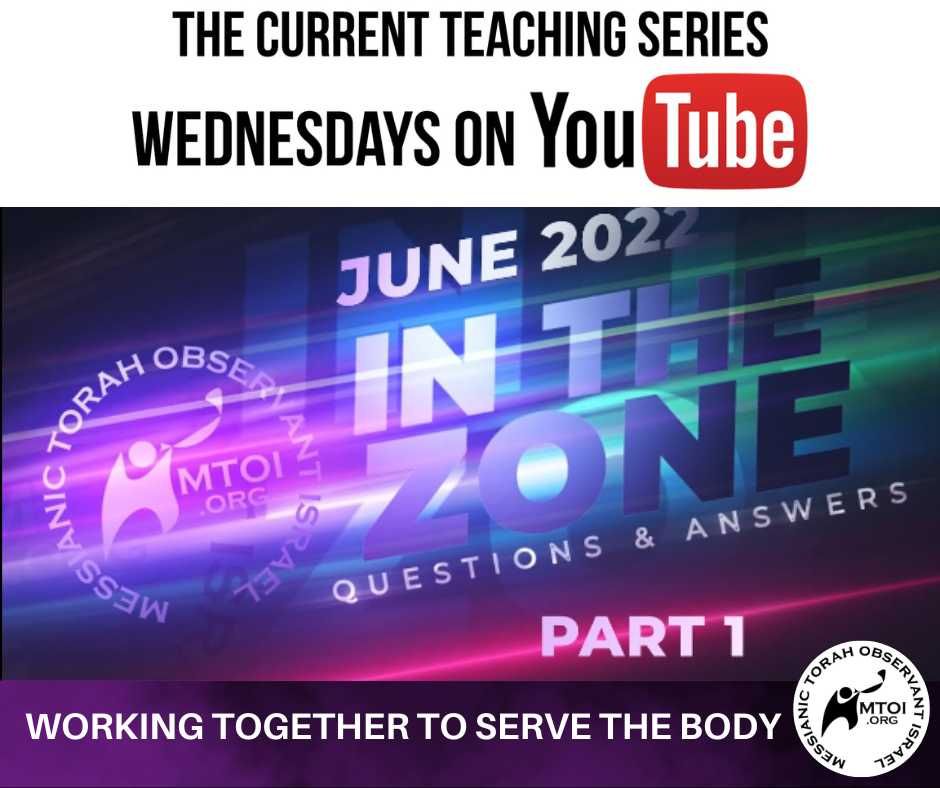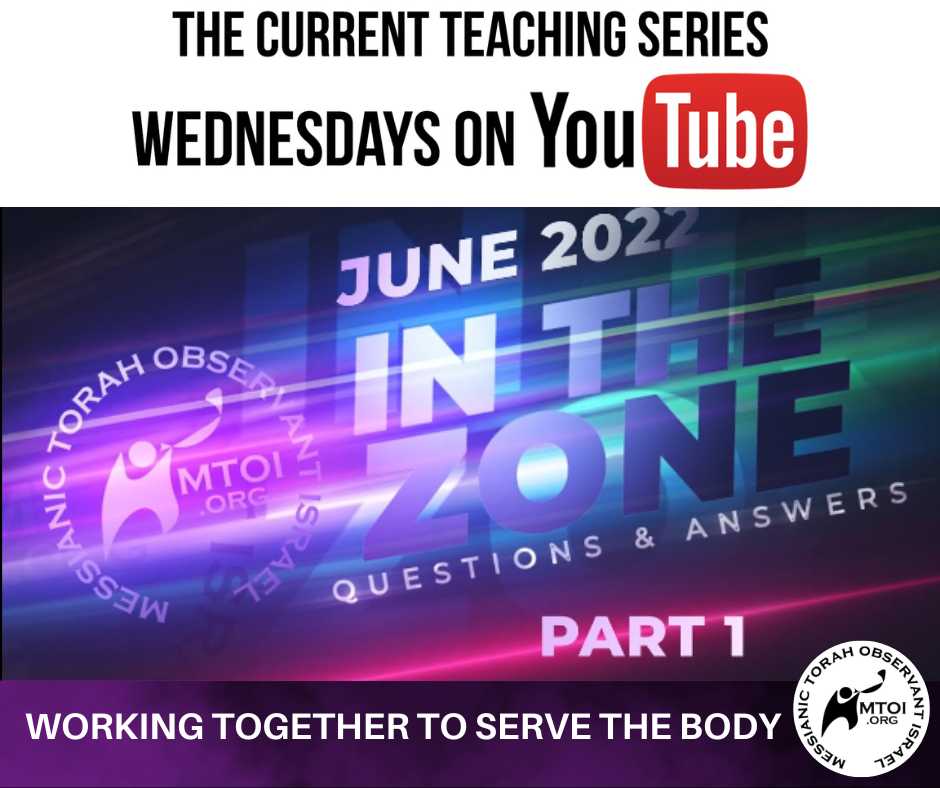Watch
Events
Articles
Market
More
Since Balaam couldn't find a fault in Israel, he taught #balak to create one. His poisoned lips say "It's the heart that counts. What could be wrong with love?" #lovewins, right?
https://soilfromstone.blogspot.....com/2010/06/paganis



Edom shall be dispossessed; Seir also, his enemies, shall be dispossessed. Israel is doing valiantly. And one from Jacob shall exercise dominion and destroy the survivors of cities!
Numbers 24:18-19
These verses are a prophecy of the eventual conquest of Edom by Judah. It was ultimately fulfilled by the Maccabees a few centuries before Yeshua. Recall that King Herod was actually an Edomite, not a Jew.



Link to teaching - https://youtu.be/M2oUPv-4czw
On the first Shabbat of the month Rabbi Steve Berkson opens the floor to the local congregants and those listening online to ask questions or make comments about any aspect of our belief.
Rabbi Berkson addresses topics about fundamental Torah-based practices, personal development, gives marital instruction, shares parental techniques and more.
Part 1:
00: 00 Intro/Motivated by your mortality
05:31 Is the ‘Evil Eye’ a metaphor for envy?
09:54 The challenge with various teachings
13:43 What is Judgment Day?
19: 07 But I want to keep my physical imperfections in Messiah’s Kingdom
20:55 When there’s nothing to work with
23: 04 How can I use the 2nd Tithe?
28: 01 Don’t enable foolishness
29:49 Two loaves of bread on Shavuot?
31:14 Is it ever acceptable for a wife to boss her husband?
40: 03 Any prophetic significance to Moses not being allowed in the Land?
41:37 The benefits of manure
44:43 Can one have Yah’s spirit and not be “born again”?
49: 05 Is Christian music acceptable for listening and worship?
Links to related and suggested teachings:
• Darkness & Light https://www.youtube.com/playlist?list...
• Well Done, Good and Trustworthy Servant https://youtube.com/playlist?list=PLf...
• INfocus: I Don't Need a Teacher! https://youtu.be/ghH0aZ0_WIU
• INfocus: The Most Evil Christian Teaching https://youtu.be/JHW4L9QTmgw
• Evil https://youtube.com/playlist?list=PLf...
• INfocus: The Opportunist https://youtu.be/Tmb39PKkyqI
• Tithing: Appreciating Blessings https://www.youtube.com/playlist?list...
• INfocus: You’re Still Wrong https://youtu.be/V9SU20AM5B8
• Do You Know the Father and the Son? https://www.youtube.com/playlist?list...
• INfocus: Picking on Nicodemus https://youtu.be/e7Wcf96hWts
Don't miss out on new teachings every week. Please click on the "LIKE" button if this video has been a blessing to you.
For more information about MTOI (Messianic Torah Observant Israel), visit our website, https://mtoi.org
Join us on Social media!
Like us on Facebook: https://www.facebook.com/mtoiworldwide
Follow us on Instagram: https://www.instagram.com/mtoiworldwide/
Follow us on Twitter: https://twitter.com/mtoiworldwide
Join us on The Torah Network: https://social.ttn.place/mtoiworldwide
Join us on Telegram: https://t.me/mtoiworldwide
We are located in Cleveland TN. If you would like to know more about us, we would love to hear from you! Feel free to visit us on our website, https://mtoi.org, email us at admin@mtoi.org or call us at 423-250-3020.
.
.
.
#midweekmotivation #Torah #Yahweh #Yeshua #Elohim #Messiah #messianic #torahobservant #clevelandtn #mtoiworldwide #inthezone




Link to teaching - https://youtu.be/M2oUPv-4czw
On the first Shabbat of the month Rabbi Steve Berkson opens the floor to the local congregants and those listening online to ask questions or make comments about any aspect of our belief.
Rabbi Berkson addresses topics about fundamental Torah-based practices, personal development, gives marital instruction, shares parental techniques and more.
Part 1:
00: 00 Intro/Motivated by your mortality
05:31 Is the ‘Evil Eye’ a metaphor for envy?
09:54 The challenge with various teachings
13:43 What is Judgment Day?
19: 07 But I want to keep my physical imperfections in Messiah’s Kingdom
20:55 When there’s nothing to work with
23: 04 How can I use the 2nd Tithe?
28: 01 Don’t enable foolishness
29:49 Two loaves of bread on Shavuot?
31:14 Is it ever acceptable for a wife to boss her husband?
40: 03 Any prophetic significance to Moses not being allowed in the Land?
41:37 The benefits of manure
44:43 Can one have Yah’s spirit and not be “born again”?
49: 05 Is Christian music acceptable for listening and worship?
Links to related and suggested teachings:
• Darkness & Light https://www.youtube.com/playlist?list...
• Well Done, Good and Trustworthy Servant https://youtube.com/playlist?list=PLf...
• INfocus: I Don't Need a Teacher! https://youtu.be/ghH0aZ0_WIU
• INfocus: The Most Evil Christian Teaching https://youtu.be/JHW4L9QTmgw
• Evil https://youtube.com/playlist?list=PLf...
• INfocus: The Opportunist https://youtu.be/Tmb39PKkyqI
• Tithing: Appreciating Blessings https://www.youtube.com/playlist?list...
• INfocus: You’re Still Wrong https://youtu.be/V9SU20AM5B8
• Do You Know the Father and the Son? https://www.youtube.com/playlist?list...
• INfocus: Picking on Nicodemus https://youtu.be/e7Wcf96hWts
Don't miss out on new teachings every week. Please click on the "LIKE" button if this video has been a blessing to you.
For more information about MTOI (Messianic Torah Observant Israel), visit our website, https://mtoi.org
Join us on Social media!
Like us on Facebook: https://www.facebook.com/mtoiworldwide and https://www.facebook.com/mtoisouthafrica
Follow us on Instagram: https://www.instagram.com/mtoiworldwide and https://www.instagram.com/mtoisouthafrica
Follow us on Twitter: https://twitter.com/mtoiworldwide
Join us on The Torah Network: https://social.ttn.place/mtoiworldwide and https://social.ttn.place/mtoisouthafrica
Join us on Telegram: https://t.me/mtoiworldwide and https://t.me/mtoisouthafrica
We are located in Cleveland TN, and have extension fellowships across South Africa. If you would like to know more about us, we would love to hear from you! Feel free to visit us on our website https://mtoi.org/mtoi-map/, to see where they are located, email us at contact.sa@mtoi.org or call us on 073 421 6481.
.
.
.
#midweekmotivation #Torah #Yahweh #Yeshua #Elohim #Messiah #messianic #torahobservant #clevelandtn #mtoiworldwide #inthezone




Making comics for the Portions that are sometimes split between two weeks instead of one.
This is the last one to split, it looks like. Next I have a few more one-off Holy Day portions to do.
http://thestraightandnarrow.cfw.me/comics/488
#bible #bibleverse #torahobservant #christian #messianic #messianicjudiasm #hebrewroots #webcomic #webcomicseries #cartoon



Israel in the wilderness included a mixed multitude of former gentiles who had joined themselves to Israel in service to YHWH, including Egyptians, Kenites, Cushites, and others. They were all included in the "you" of Balaam's prophecy concerning #israel: "Blessed are those who bless you. Cursed are those who curse you."
Numbers 24:9



Tradition and legend surround time in the Bible. Evolution and millions of years compete with creation. When a day begins and how long a day is in Genesis have distracted us from the reality of what is written. Genesis 1;14, “And God said, Let there be lights in the firmament of the heaven to divide the day from the night; and let them be for signs, and for seasons, and for days, and years” The perpetual calendar described in this verse is a clue that our Creator designed specific times for our benefit even before Adam was created and that means He had mankind planned as He created this universe we live in.



Shalom Shalom family ?
Proverbs 16:1-8
To man belong the plans of the heart, _but from YHVH comes the reply of the tongue._
All a man's ways seem innocent to him, _but motives are weighed by YHVH_
*_Commit to YHVH whatever you do, and your plans will succeed._*
YHVH works out everything for His own ends even the wicked for a day of disaster.
YHVH detests all the proud of heart. Be sure of this: They will not go unpunished.
Through love and faithfulness sin is atoned for; through the fear of YHVH a man avoids evil.
When a man's ways are pleasing to YHVH, he makes even his enemies live at peace with him.
Better a little with righteousness than much gain with injustice.
In his heart a man plans his course, but YHVH determines his steps.
Our loving Heavenly Father, Holy and Sovereign God El Shaddai, thank You for awaking us this day with renewed joyful Spirit of mind. Thank You for every single moment we can commit to You and give you all that we are. Thank You for blessings and provisions in this day, making our paths straight to walk in righteousness with You. We Love You and declare Your Name YHVH as only God upon our lips. May this day be according to Your will and way and every tounge confess that You are God. Please bless our children with Your Shalom, protect them from all sides with Your covering. Please give us the strength, trust and courage to walk bravely in Your commandments. Please bless the labour of our hands and let Your Spirit be in our work place. Please heal the sick, the broken hearted and the poor. We pray for a blessing over our spouses and marriages and each family member. Please fill our friends with the joy of gladness, let them see Your light and blessings in their life. Forgive us all our sins and trespasses against Thee and others. Please provide us our daily bread. Let Thy Kingdom come and will be done on earth as in heaven. Amein
Be blessed and stay blessed ?


